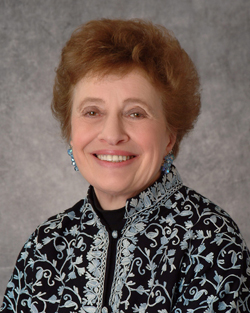University of Arkansas professor Sandra Stotsky testified last month before the Texas Legislature in favor of a proposed law that revisits the centuries-old issue of states' rights.
Texas lawmakers are considering a proposed bill that gives the state sovereignty over curriculum standards, assessments and student information and prohibits the state from adopting national education standards promoted by the National Governors Association and the Council of Chief State School Officers. House Bill 2923 states that school districts must provide instruction in the essential knowledge and skills at appropriate grade levels as determined by the Texas Board of Education with the participation of educators, parents, business and industry representatives and employers. A district may not meet this requirement through the use of national curriculum standards, according to the proposed legislation.
The bill goes on to say that the Texas Board of Education may not adopt national curriculum standards to comply with its duties.
The bill was drafted in response to the Common Core standards created through an initiative coordinated by the National Governors Association Center for Best Practices and the Council of Chief State School Officers. The standards, released June 2, 2010, so far have been adopted by 42 states, the District of Columbia and the U.S. Virgin Islands.
"This is a hugely important bill and a hugely important matter," said Stotsky, who holds the Twenty-First Century Chair in Teacher Quality in the College of Education and Health Professions. "It has implications for the entire country. The high school curriculum and assessments in mathematics and English language arts based on Common Core standards will lower educational attainment in the United States."
Stotsky served as senior associate commissioner in the Massachusetts Department of Education from 1999 to 2003. During that time, she led the development or revision of all of the Massachusetts K-12 standards. She reviewed all states' English language arts and reading standards for the Fordham Institute in 1997, 2000 and 2005. She co-authored Achieve's American Diploma Project high school exit test standards for English in 2004 and the 2008 Texas English language arts and reading standards. She served on Common Core's Validation Committee from 2009 to 2010.
"Texas has the best English language arts and reading standards in the country, now that the first-rate standards that Massachusetts, California and Indiana once had have been dumped and these states have adopted Common Core's. Texas is also developing the best K-12 math standards in the country," Stotsky said. "The Common Core standards in English language arts and reading do not aim for a level of achievement that signifies readiness for authentic college-level work."
Stotsky was one of five members of Common Core's Validation Committee who voted against accepting the final version of the standards. In her testimony to the Texas lawmakers, she outlined four reasons for her no vote:
- The mediocre quality of Common Core's English language arts and reading standards, especially in grades 6-12, and what the lack of international benchmarking means.
- The high academic quality of Texas's 2008 English language arts and reading standards.
- The non-transparent process that was used to develop Common Core's standards.
- The non-transparent process now being used to develop a national curriculum and national tests based on Common Core's standards by the two testing consortia funded by the U.S. Department of Education.
James Milgram, professor emeritus of mathematics at Stanford University, also testified in favor of the Texas legislation. He served with Stotsky on the Validation Committee and voted with her against adoption of the final version.
Read Stotsky's testimony at http://coehp.uark.edu/colleague/9863.php.
Read Milgram's testimony at http://coehp.uark.edu/colleague/9864.php.
The Texas bill was voted out of the Select Committee on State Sovereignty on April 28 and is in the Calendars Committee waiting to be moved to the House floor.
Contacts
Heidi Wells, director of communications
College of Education and Health Professions
479-575-3138,
